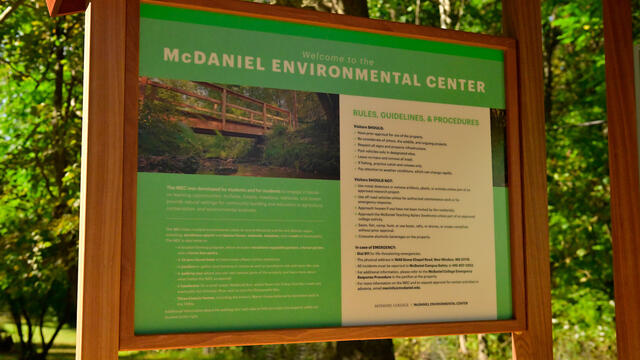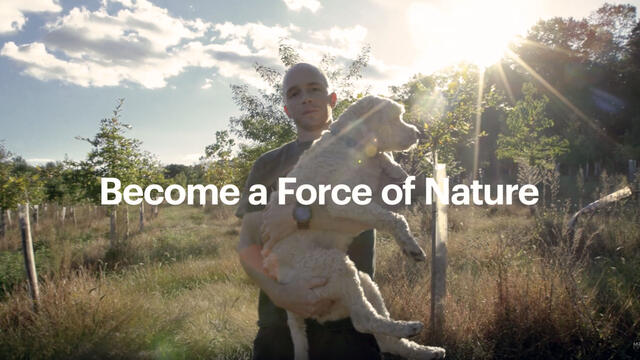McDaniel College introduces new environmental center
McDaniel College hosted the official unveiling of the McDaniel Environmental Center, an outdoor learning lab developed by students to engage in hands-on educational opportunities in agriculture, conservation, and environmental sciences, as well as community building. Additionally, McDaniel has received $2.3 million from the State of Maryland to fund educational environmental spaces and the college has introduced a new bachelor's degree in Food Studies this fall.

Members of the McDaniel College community along with business and community leaders, government officials, and other invited guests gathered Sept. 29 for the official unveiling of the McDaniel Environmental Center.
Known as the MEC, the property, formerly the Singleton-Mathews Farm, is located in New Windsor, Maryland, about 15 minutes from McDaniel's Westminster campus.
An outdoor learning lab developed by students to engage in hands-on educational opportunities in agriculture, conservation, and environmental sciences, as well as community building, the MEC's 58 acres provide McDaniel students with opportunities to engage in research and course-based experiences, lab-based experiential learning, community service projects and independent study work.
President Julia Jasken spoke about the impact the MEC is having not just on McDaniel, but also in the larger community, while announcing that the college has received $2.3 million from the State of Maryland for educational environmental spaces, both at the MEC and on McDaniel’s campus. This includes renovations to the campus greenhouse and the transformation of Harvey Stone Pavilion into an outdoor living learning laboratory.
"I am grateful to have access to a resource like the MEC and professors that care so much about experiential learning," said Jessie Titus '22.
She also introduced the new bachelor’s degree in Food Studies that launched this fall. An interdisciplinary field that examines the relationship between food and the human experience, the program combines coursework from various departments on campus.
Other speakers at the event included Environmental Studies faculty Jason Scullion and Elly Engle, Jessie Titus '22 of Frederick, Maryland, who majored in Environmental Studies and was involved as a Food Fellow, and Sarah Koser from the Chesapeake Bay Trust, who has supported the establishment of the MEC.
More about the McDaniel Environmental Center
The McDaniel Environmental Center (MEC) consists of 30 acres of forested land, 20 acres of fields, and eight acres of student farming land.
This includes:
- a student farming program, including the 1.5-acre Shaffer Forest Garden,
- five-acre Forest Bank funded by the Alliance for the Chesapeake Bay,
- an educational sign tour highlighting the importance of central Maryland’s Piedmont region, funded by the Chesapeake Bay Trust,
- wetland restoration sites supported by funding from the Maryland Native Plant Society and the Chesapeake Bay Trust,
- five bodies of water, and
- three historic residences.
A campus garden and a greenhouse located on McDaniel’s campus also expand the offerings available for McDaniel students.
More about Environmental Studies
The Environmental Studies department at McDaniel launched in 2012 and provides students the opportunity to explore the relationship between humans and their environment both in the classroom and through experiential learning opportunities.
Students can major or minor in Environmental Studies. Those majoring in Environmental Studies choose from three tracks: Environmental Studies—Policy and Management specialization, Environmental Studies—Biology specialization, or Environmental Studies—Earth System Science specialization. The program also benefits from collaboration with other departments on campus, such as Biology and Political Science.
